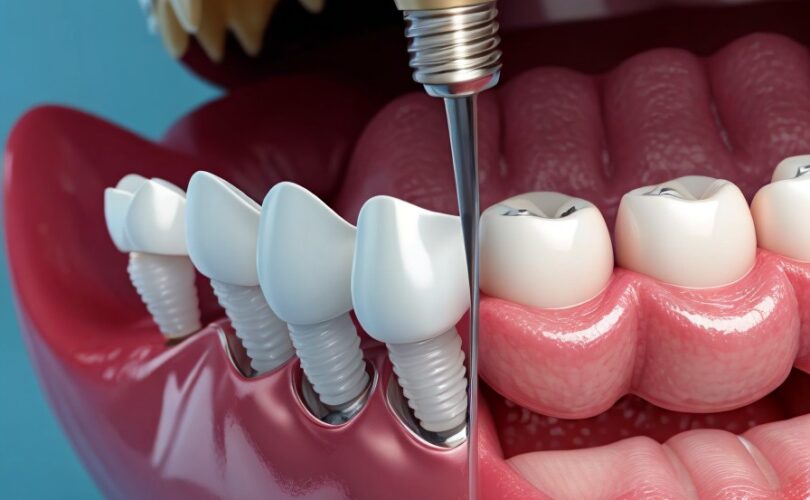Unveiling the Cost of a Single Tooth Implant: No Insurance, No Problem?
Missing a tooth? Dental implants offer a natural-looking and long-lasting solution to restore your smile and chewing function. But let’s face it, dental procedures can be expensive. If you’re considering a single tooth implant and don’t have dental insurance, understanding the costs involved is crucial.
This guide will break down the factors affecting the price of a single tooth implant without insurance, helping you make informed decisions about your dental care.
Table of Contents
- Unveiling the Implant Price Puzzle
- A Breakdown of Costs
- Beyond the Implant: Additional Expenses
- Strategies for Managing Costs
- Conclusion: A Smile Worth the Investment?
Unveiling the Implant Price Puzzle
The cost of a single tooth implant without insurance can vary significantly. There’s no one-size-fits-all answer, and the final price depends on several factors.
A Breakdown of Costs
Here are some key factors influencing the cost of a single tooth implant:
- Geographic Location: Dental implant costs can vary depending on your location. Major cities might have higher fees compared to rural areas.
- Experience of the Dentist: The expertise and experience of the dentist or oral surgeon placing the implant can affect the cost. More experienced professionals might charge higher fees.
- Complexity of the Procedure: Simple implant placements are generally less expensive than complex procedures involving bone grafting or other surgical techniques.
- Type of Implant & Materials: The specific type of implant used and the materials it’s made from can influence the cost.
- Abutment & Crown: The abutment (connector) and the dental crown (artificial tooth) are separate costs factored into the overall implant procedure.
Beyond the Implant: Additional Expenses
Remember, the implant itself isn’t the only cost to consider. Here are some additional expenses to factor in:
- Consultation Fees: There might be a consultation fee for the initial discussion and evaluation of your dental needs.
- X-rays & Diagnostic Tests: X-rays, CT scans, or other diagnostic tests might be needed to assess your jawbone health and suitability for an implant.
- Anesthesia: The type of anesthesia used during the implant surgery can affect the cost.
- Medications: You might need antibiotics or pain medication after the procedure, which adds to the overall cost.
Strategies for Managing Costs
While dental implants can be expensive, there are ways to manage the costs without insurance:
- Shop Around: Get quotes from different dentists in your area to compare implant fees.
- Consider Dental Schools: Some dental schools offer implant procedures at a lower cost by students under the supervision of experienced dentists.
- Flexible Payment Options: Many dental practices offer flexible payment plans to help you manage the cost of treatment.
- Explore Discount Dental Plans: Some discount dental plans offer negotiated rates on dental procedures, including implants. However, these plans typically don’t cover the entire cost.
Conclusion: A Smile Worth the Investment?
Dental implants offer numerous benefits, including improved chewing function, a natural-looking smile, and potentially improved self-confidence. While the cost of a single tooth implant without insurance can be significant, it’s an investment that can last a lifetime. By exploring cost-management strategies and discussing financial options with your dentist, you can make an informed decision about whether a dental implant is right for you and your budget.
Tips & Tricks for This Content Model: Weave in Personal Stories & Cost Comparisons
This conversational content model thrives on relatability and real-world examples. Here are some ways to incorporate personal stories and cost comparisons to make your content even more engaging:
- Share a relatable anecdote: Have you ever researched the cost of dental implants? Express surprise at the range of prices you discovered and emphasize the importance of cost transparency.
- Cost comparisons: While you can’t give specific prices (which can vary greatly), offer general comparisons. For example, mention that implant costs might be comparable to or slightly higher than the cost of a high-end crown or bridge.
- Financial planning tip: Briefly discuss the concept of factoring potential dental costs into your long-term financial planning, especially if you’re considering multiple implants or other dental procedures in the future.
Here’s an example of how you can incorporate these tips in the “Unveiling the Implant Price Puzzle” section:
Unveiling the Implant Price Puzzle: Let’s face it, researching dental implant costs can feel like cracking a code. You might find prices online ranging from a few thousand dollars to upwards of ten thousand dollars for a single tooth. This can be overwhelming! The truth is, the cost of a single implant depends on several factors, and this guide will help you understand what those factors are.
By incorporating relatable anecdotes and cost comparisons, you can create content that resonates with readers on a personal level and empowers them to make informed decisions about their dental care.
FAQ’S
Q: How long does a single tooth implant typically last?
A: With proper care and maintenance, dental implants can last a lifetime! They are a durable and long-lasting solution for replacing missing teeth.
Q: Does it hurt to get a dental implant?
A: Modern dentistry offers various anesthesia options to minimize discomfort during the implant placement procedure. You’ll likely experience some soreness and swelling after the procedure, but your dentist will prescribe medication to manage these side effects.
Q: What are some alternatives to dental implants?
A: Depending on your specific situation, alternative options for replacing a missing tooth might include dental bridges or dentures. These options can be less expensive than implants, but they might not offer the same level of durability and functionality. Consult with your dentist to discuss the best course of treatment for your needs.
Q: Does dental savings or discount plan membership help offset the cost of implants?
A: While some dental discount plans offer negotiated rates on dental procedures, these plans typically don’t cover the entire cost of an implant. However, they might offer savings on other aspects of the treatment, such as X-rays or consultations.
Q: What should I consider when choosing a dentist for a dental implant procedure?
A: Look for a dentist with experience and expertise in placing dental implants. Ask about their qualifications and success rates with implant procedures. It’s also important to feel comfortable with the dentist and their staff to ensure a smooth and positive experience.

